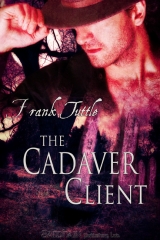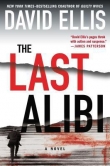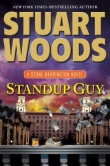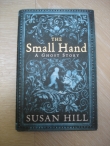
Текст книги "The Cadaver Client"
Автор книги: Frank Tuttle
сообщить о нарушении
Текущая страница: 5 (всего у книги 5 страниц)
Chapter Five
The undertaker’s parlor smelled of fireflowers, cinnamon and half a dozen kinds of particularly pungent incense.
And something else, of course. An odor so primal and familiar and so immediately and deeply disturbing that no number of imported incense-sticks could ever hope to do anything more than slightly obscure it.
If the smell of death bothered Echols, of Echols, Masey and Benlop, Morticians, he didn’t let it show.
“Good afternoon, sir,” he said in a voice that oozed a deep and sincere concern. “How may I be of assistance, in this hour of your deepest sorrow?”
We were seated in the reception room. The walls were pine stained dark to mimic oak. The floor was covered in at least three threadbare rugs, each placed to cover the holes in the one beneath it. The ceiling was warped and cracked, and at one point I could hear scrambling above as rats scurried by on urgent business of their own.
I did not want to know what those rats had last feasted upon.
“I’d like to hire a hearse-wagon and a pair of ponies for the night.”
The imperturbable Echols raised an eyebrow.
“And caskets. You have a selection here, I presume?”
“Oh, yes, sir. Finely made, I dare to add, yet priced with an eye toward consideration for the family of the deceased.”
“I’ll need one. A good one. Top of the line. Shiny, with lots of trim.”
Echols almost brightened at that, but managed to keep his enthusiasm from inducing more than the slightest reduction in the furrowing of his brow.
“One is saddened to have to ask this, sir, but nevertheless I must.” He paused dramatically, leaning in toward me. If I’d been a woman, he’d have laid his right hand gently atop mine. His big soft eyes practically welled up with heartfelt tears of abject sorrow.
“When will Sir be bringing the remains by, for final preparations?”
I grinned. “I’m right here, my good man. Shall we start by settling on a price?”
“Boy,” said Mama. “I’m tellin’ you right now I don’t like none of this.”
I grunted. The closest thing I had to a suit was my old Army parade jacket and a freshly bleached white shirt and a pair of black pants I’d managed to haggle out of Echols. I’d put a shine on my old Army doggers, and they’d have to do as fancy grave slippers.
I was more worried about my possible need for sudden mobility than actually completing the look of a well-dressed corpse.
I finally got the jacket on. Buttoning it was out of the question. Who’d have thought wool would shrink so much, hanging in my tiny closet for ten years?
“I’m the one who’ll be taking a ride in a coffin, Mama. All you’ve got to do is sit there and look bereaved.”
Mama grunted. “After Curfew.”
“Mama, I’ve seen you break Curfew a dozen times in the last month alone.”
She couldn’t argue with that.
“Still don’t hold with this funeral business.”
I shrugged. I’d already explained to Mama why I thought it was necessary.
If we were facing sorcery, that sorcery was created to respond to certain acts or situations as triggers for built-in actions. That much I knew from being in the Army.
And if something in that cemetery was lying in wait for me, I didn’t want it choking me at the gate.
But anything that hides in a cemetery is going to have to be built to ignore a few things. First among these things would be funerals.
And even if what had tried to strangle Mrs. Mays was a murderous ghost, well, I had surprises in store for it too.
“Ain’t no way Granny is mixed up in no shenanigans, boy.”
“Not knowingly. I never said she knew what was going on.”
My reasoning was this-assume the man Gorvis is so bent on getting his hands on Marris Sellway one more time that he planned all this. He had himself buried right next to Granny Knot’s stomping ground, because he’d also heard she was the real deal. He comes spooking around to her, with sob stories of lost love and guilt. He hands her a small fortune and begs her to give it to the wife he left behind.
Only the coin is tainted, either cursed or ensorcelled so that it leads him right to her.
My reasoning worked whether Gorvis had hired a sorcerer before his death to put all this in place, or whether, against my better judgment, he’d risen from the grave to do the dirty work himself.
But either way, he hadn’t counted on Granny hiring me. Or Marris having so much money of her own that three hundred crowns was something she could sneer at.
But even without the money being near her, I knew whatever was out there would eventually find her, or her daughter. And that would be partly my fault.
And that wasn’t going to happen.
So the funeral carriage, and the coffin, and my old Army jacket to boot.
That’s something else I’d learned, way back when. Never go into a battle by doing exactly what the other side expects you to do. Show them something new. Make them pause and scratch their heads and think.
Make them wonder just what it is you’re up to.
“You understand what I need you to do, Mama?”
“I ain’t daft, boy. I remember.”
“Good.” I squinted at the light seeping around Mama’s doorframe. The sun was about to sink behind the rooftops. Soon I’d need to climb into my casket and prepare for my sad, slow journey through Rannit’s empty streets.
I just hoped it wouldn’t be my last.
Mama sent word to Mrs. Mays via one of the street kids she feeds. True to her word, Mrs. Mays met us at the corner of Stricken and Pack.
I popped out of my casket long enough to do a head count.
I whistled.
Summers, arrayed in clean, black funeral finery, sat atop a white widow’s cab. Behind the widow’s cab were six road-beaten heavy transport stagecoaches, and from the number of faces I could see through the barred windows I figured she’d brought close to a hundred men.
I could have kissed her. A hundred armed men, many of them presumably vets who rode with the Stig River Runners. The halfdead usually hunted in pairs. Even vampires would find those odds daunting.
Mrs. Mays popped out of her cab and lifted her veil so she could see better. Her face was half wonder and half horror at my choice of conveyance.
I opened the lid and sat up.
Summers cussed and spat.
“Good work, Mrs. Mays. Don’t be alarmed. This is all to get us in safely. Follow, please.”
I lay back down and let the lid slam shut. Mama snapped the reins and away we went.
Mama was dressed for the event too. She wore a stovepipe hat half as tall as she was, and she had her mane of hair pulled back into a bun. Her long suit coat had tails that actually dragged the ground behind her stubby legs. We would either fool the haunts or the magics, or we’d send them hiding from all the ugly.
We’d had to stop and light the stage and carriage lanterns before we got anywhere near Elfway. I had Mama circle around a bit, since I wanted us to arrive an hour after Curfew fell. I was hoping that would reduce the number of the curious that came out to see our little show.
It didn’t. Word got around, somehow, that some bunch of daft fools was breaking Curfew to hold a funeral. The presence of the stagecoaches and Mama Hog as driver provoked more interest than I had anticipated. By the time we reached the forlorn cemetery at the bad end of Elfway, my hearse was at the head of a middling good parade.
Nothing I could do about that, though. I did worry briefly about interference by the Watch, who I knew would let a hundred-strong funeral party get themselves killed if they wanted, but who might show up to disperse a crowd of gawkers. That worry died when I saw a half-dozen round blue Watch hats buying snacks from a woman who had turned her stoop into a temporary eatery.
My hearse rattled to a halt. A couple of stout, young men from the stagecoach behind us ran past, put fresh flowers in the gate urns, and mumbled the prayers begging mercy and rest for the one about to be interred. I could hear Mama muttering words of her own, but she was peppering her utterances with far too many curse words for them to be prayers.
The cemetery gates swung open with a pair of rusty screeches. Mama snapped the reins again, and I closed my eyes as we passed the threshold, since most corpses probably aren’t eyeing their lids with any kind of intense interest.
Nothing happened. We rolled uphill.
Mama got lost once, and the stages had trouble getting turned around, but we finally reached the wardstone.
I stirred, flexed my arms, but kept my lid closed.
“Granny ain’t here,” said Mama. Her tone was worried. “That ain’t right. She said she’d be here.”
I risked a whisper. “Have a couple of the boys look around.” I didn’t have a good feeling about what they were likely to find.
Either way, spook or spell, Granny Knot was a liability, once she’d served her purpose. Because if she could talk to the dead and help them enter the world of the living, she could also send them back where they belonged. At least according to Mama.
Shouts, and Mama cussed. My heart sank.
“Found her.” Mama was worried. “They’re seein’ if she’s dead.”
“Well?”
Mama clambered down, and I heard her stomp away. Someone called for water. Someone else called for a blanket.
Mama came rushing back to stand beside the rear of the hearse.
“Ain’t dead. Yet. Took a knock to the head. Pushed down into a wardstone, I reckon.”
“Is she conscious? Can she help?”
“Just you and me, boy.”
I bit back a curse. It was getting hot in the casket and sweat was pouring off me. I was tempted, so tempted to get out, to feel cool air, to at least open the lid. If Granny had been right, if spooks had nearly as much trouble seeing the world of the living as we did the spooks themselves, the risk would be small. All anything dead, alive, or ensorcelled would likely see was a hearse and a casket and a bunch of men milling around a grave.
“Let’s get this going then.”
Mama barked orders. I heard stage doors open and shut, the clang of shovels on shovels, the voices of a hundred wary young men.
And then I began to hear the thock-thock of shovels biting into the earth, and the thud of turned earth being cast out of the way, and I silently urged them to hurry.
It didn’t take them long.
I heard the first shovel strike the buried casket. It was a wet solid sound. Being shut in a casket myself gave the sound a certain memorable quality.
They went carefully, from that point on. I could hear them working in shifts-one man would take ten digs, then leap out of the grave and be replaced. Four men stayed down that way, all of them fresh. The others ringed us, facing outward, their shovels in one hand and plain sharp swords under their coats in the other.
Mama kept me updated in whispers. The crowd remained outside the fences, hooting and drinking and setting fires in the street and generally doing the things that might attract a bevy of thirsty halfdead and thus get them killed. The Watch, as far as Mama could tell, had lingered for a bit and then vanished, apparently deciding that if a whole neighborhood wished to commit mass suicide, it was no concern of theirs.
Still, no halfdead had appeared. I knew that by the lack of agonized screaming from the street.
“They’re ready to lift it out,” said Mama.
“Go ahead.”
Mama gave the word. Men grunted. Ropes strained. Clods of wet earth fell.
There was a thud, and it was done.
I slammed the lid of my coffin back and hauled my stiff, sweat-soaked body out of the damned thing. Mama had a half dozen of Mrs. Mays’s troops haul it out of my hearse, and put it on the ground next to the one they’d just dug up.
Everyone tensed. Mama had her dried owl in a white-knuckled death grip. Mrs. Mays floated to my side, her eyes wide and wet behind her veil. Her daughter stood with her, holding her hand. Natalie met my eyes and held onto her mother for dear life.
“We’re ready, Mr. Markhat.”
I nodded. Axes flashed. The lid of the coffin put up a fight, but six months of wet earth had done its work.
There, after a moment, was the man himself.
I’d expected a bundle of sticks and hair or a complex arrangement of bones and silver threads-anything of the sort sorcerers tend to favor when they’re fashioning their wonders.
But this was just a man. A dead man, a dead man buried for six months.
There wasn’t much left. The coffin had leaked. The smell wasn’t even what I’d expected. Instead, it was more wet, rich earth than a full and awful dose of the odor from the undertaker.
I doubt even the corpse of a kindly old granny ever looks benign and peaceful. But even after six months in the ground, I could still see the hate and fury in the set of the dead man’s jaw, and the shadowed gape of his hollow eyes. His skeletal hands were on his chest, but they were clenched as if holding something, or choking it.
“I speak your name, Horace Gorvis. You have no power over me,” said Mrs. Mays. Her voice shook, but she got the words out, just like Mama had written them. I hoped they were the right words. “You never did. I said no then, and I say no now. I spoke your true name. Trouble me no more.”
“I speak your name, Horace Gorvis. Your power died when you did,” intoned her daughter. “I spoke your true name. Trouble us no more.”
“I speak your name, Horace Gorvis. You’re dead and gone and good riddance,” said Mama. “Mr. Summers, knock his damned fool head off.”
Summers lifted his shovel high and let it fall.
The air around us went cold. Dead of winter cold. Our exhalations steamed and twisted in a wind none of us could feel.
Mrs. Mays’s hands went to her throat.
“Oh, I reckon not, Horace Gorvis.” Mama stood on her tiptoes and slipped a loop of string around Mrs. Mays’s throat. A little bag, twin to the one Mama had given me, settled at the base of Mrs. Mays’s throat.
“You ain’t got no business here, Horace Gorvis. Whatever you was when you lived, all that’s over. Over and done. Now git.”
Mama reached down into the coffin and held up the man’s freshly severed head. She eyed it critically and knocked it hard twice against the wardstone. Most of the clinging hair and remaining tissue fell away.
Mama wrapped what looked like a dirty rag around the skull’s vacant eye sockets. Then she drove thick iron spikes into the spots the ears had been, and she grunted as she tore the jaw away.
“We come to bury this sorry excuse for a man,” said Mama. She chunked the skull into the new casket. “He can rest in peace or not, for all I care, but he ain’t gonna walk no more.” The jawbone followed. Teeth came loose and bounced and rattled. “May Angels fly him to his rest and all that hogwash, amen. Mr. Summers, finish him.”
“More’n happy to.”
Summers and his shovel went to work. Mama hauled the parts out as they became available, saying a few words over each one. I didn’t think the somber Echols would have approved of Mama’s hostile running eulogy one bit.
The air grew colder. Torches flickered and wavered, and a few went out. Mama handed Natalie a bag of her own when she yelped and whirled as though she too had been touched.
“Mind me, Horace Gorvis. This is for them fires what you set,” said Mama. She tossed the man’s two severed hands into the coffin and then opened a bag of what appeared to be salt and poured it over the remains.
“And this is for all them you hurt.” Another bag, this one of ash.
“And this is for Granny Knot.” A final bag, the contents wet and dark and dripping.
Out in the night, something shrieked.
Mama nodded at me. I called in the troops and had them gather around, more to block the view from the street than for any other reason. The very last thing I wanted was a sudden mob of enterprising grave robbers showing up the moment we were at home in our beds.
I called out. True to his word, Skillet scampered up, out of breath and grinning. If he’d followed my instructions, and his mere presence suggested he had, he’d carried the bag aimlessly around Rannit, keeping anything attached to it occupied while we’d dug it up.
I opened the bag and made a quick count. Skillet looked hurt. I eased his delicate feelings with a handful of perfectly good silver and sent him on his way.
The dead man’s coin was all there, aside from the few I’d spent. Mama had assured me that which remained would be enough.
“This is for my window pane, you bullying worthless spook,” I said. “Take your money. We don’t want it. I hope the winged Angels drop you on your nasty head.”
And I poured the bag of treasure out, coin by coin, onto the scattered corpse.
I heard it. We all did. A long, high, agonized scream, a scream mad with rage and fury and, finally, defeat.
The chill in the air died as the last coin joined its brothers.
Mama spat down into the casket.
“Now stay dead.”
I nodded, and shovels were replaced with bright new hammers and silver nails, and if anything remained aware inside that casket after Mama’s bags and Summers’s shovel, I almost pitied it.
Almost.
The rest was anticlimax.
Granny Knot started moaning and moving about the time we got the new coffin lowered into the grave. I had the boys scrape the bits of the former Horace Gorvis that had spilled onto the ground on top of the lid, and then we covered it with a thin layer of earth.
Next, we burned the old coffin. Mama added some of her own special items to the flames, and whatever she added made them burn high and fast and blue and hot. When the sudden inferno finally died, there was nothing, and I mean nothing, left but ashes and a handful of melted iron nails.
They went into the grave too. With so many men working, it was over before I’d had time to say much to Mrs. Mays or her daughter.
They kept watch over the proceedings though. They held one another, and I suppose they both cried a bit. Ten stalwart Runners kept them in the middle of a tight circle of swords the whole time.
I let go a sigh of relief.
“Granny any better?”
Mama’s face was blank. She does that when she has unpleasant things to say. I put my hand on her shoulder.
“I’ll get her a doctor,” I said. “Least I can do. Should have seen that coming.”
“Wasn’t your fault, boy. You put down the one what done it.”
I spoke softly. “You sure about that?”
Mama nodded an affirmative. “I ain’t got to be a spook doctor to know when Death has took his own. That one there won’t be troubling nobody never again.”
The men with the shovels stopped and leaned on them. The grave was filled in, neatly mounded.
And occupied. For good.
“I consign this evil, worthless blight on the earth to the worms and the devils,” I said, loud enough for wives and daughters and Runners and revelers to hear. “I hope they both choke on him. Amen, amen and good night.”
And that, as they say, was that.
Epilogue
I made it to Natalie’s wedding, by the way. In the pleasant company of a certain Miss April Hawthorne. I even met Mr. Mays. He thanked me for what I’d done, so I guess Mrs. Mays finally told him the truth about Cawling Street and a man named Gorvis. He sent a man around to my office the next day, and when he left, I was twenty-five crowns richer.
Natalie greeted me at the reception, but no more than that, and I was glad. The last thing I’d wish on a new bride was any remembrance of that night in the cemetery.
The day after the wedding, Mama and I set out once again for Elfway.
Mama Hog can bake a fine pan of biscuits, when she puts her mind to it. Those biscuits and that Pinford ham were filling the cab with an aroma that set my stomach growling nearly loud enough to spook the horses.
Mama laughed. “You done et two of ’em, boy. Leave a few for poor Granny.”
We were nearly there. Granny had lain insensate for three days, tended by the best doctor I could afford. Despite the doctor’s best efforts, Granny woke, got up and was showing every sign of making a full and speedy recovery.
We’d been by every day since she’d awakened. Mama took her something new each trip-so far we’d shared a chocolate cake, a plate of deviled eggs, a platter of tomato sandwiches, and now, biscuits and ham.
According to Granny, we’d done all the right things, laying Gorvis to rest like we had. She had chortled about my arrival in the coffin, which she’d said was just my way of making a grand entrance.
The cab finally rattled to a halt, and Granny Knot herself, the right side of her face still swollen and blue, met us on her stoop.
“Well, well, if it ain’t Mister Markhat his-self. Leave your funeral wagon to home, did you?”
“Hello, Granny. You’re looking spry today.”
“I look like a beat-up, old woman, son, but thank ye all the same. Ya’ll come on in. I’ve got us some coffee a brewin’.”
We went in. Granny peeked under the cloth covering Mama’s basket and grinned.
“Now that there will set a body right.”
Granny’s shack stank of something burning. No, not just any something-I knew that smell.
“Granny, why are you baking dog crap?”
“I ain’t baking it, boy. I’m makin’ candles. Grave candles, for our favorite friend’s grave.”
Mama’s eyes went hard.
“Why? He ain’t tryin’ to come back, is he?”
Granny cackled. She waved her handful of rags in triumph.
“Whatever is left of him ain’t never comin’ out of that grave. Not after what you done. But these here candles stink worse to spooks than they ever will to us. I ain’t of a mind to let bein’ knocked in the head pass without some vengeance. So I reckon if there’s a shred of Mister Big Britches left he can choke on my candles every night for a spell.”
Granny winked. “Might be a long, long spell.”
Mama nodded. “Serves him right.”
“Look what I done. Left the coffee in the kitchen.”
“I’ll get it, set yourself back down.” Mama waddled off into the next room.
“I commend you, finder,” Granny said in a whisper. The rags she clutched fell into her lap. “Your actions saved my life and well as the lives of the Sellway woman and her daughter.” She frowned. “I apologize for allowing that beast to deceive me so easily.”
“That beast had a lifetime of practice at being a two-faced bastard, Granny. You’re here eating biscuits. He’s decomposing and sniffing dog crap candles. I’d say you didn’t have a thing to apologize for.”
She smiled. Mama trundled back inside, cups in her hands, a big grin on her wide whiskery face.
“Now, Granny. Tell us how you’re a feelin’ these days.”
I opened a window, grabbed a biscuit, and headed back out into the sun. Mama and Granny gabbed. The cemetery was so close I could have thrown my biscuit right over the hedge-wall.
Marris Sellway could sleep sound, these nights. And walk the streets without fear that the next turn of a corner would put her face to face with the monster of Cawling Street.
I finished the biscuit and wiped off the crumbs and wrapped a chunk of ham in a napkin for Three-leg.
I got up. “Need to stretch my legs, Mama,” I yelled. “Be back in a bit.”
And when I walked past Horace Gorvis’s fresh new grave, I whistled a merry tune, and, like Marris Sellway, I never once looked back.








